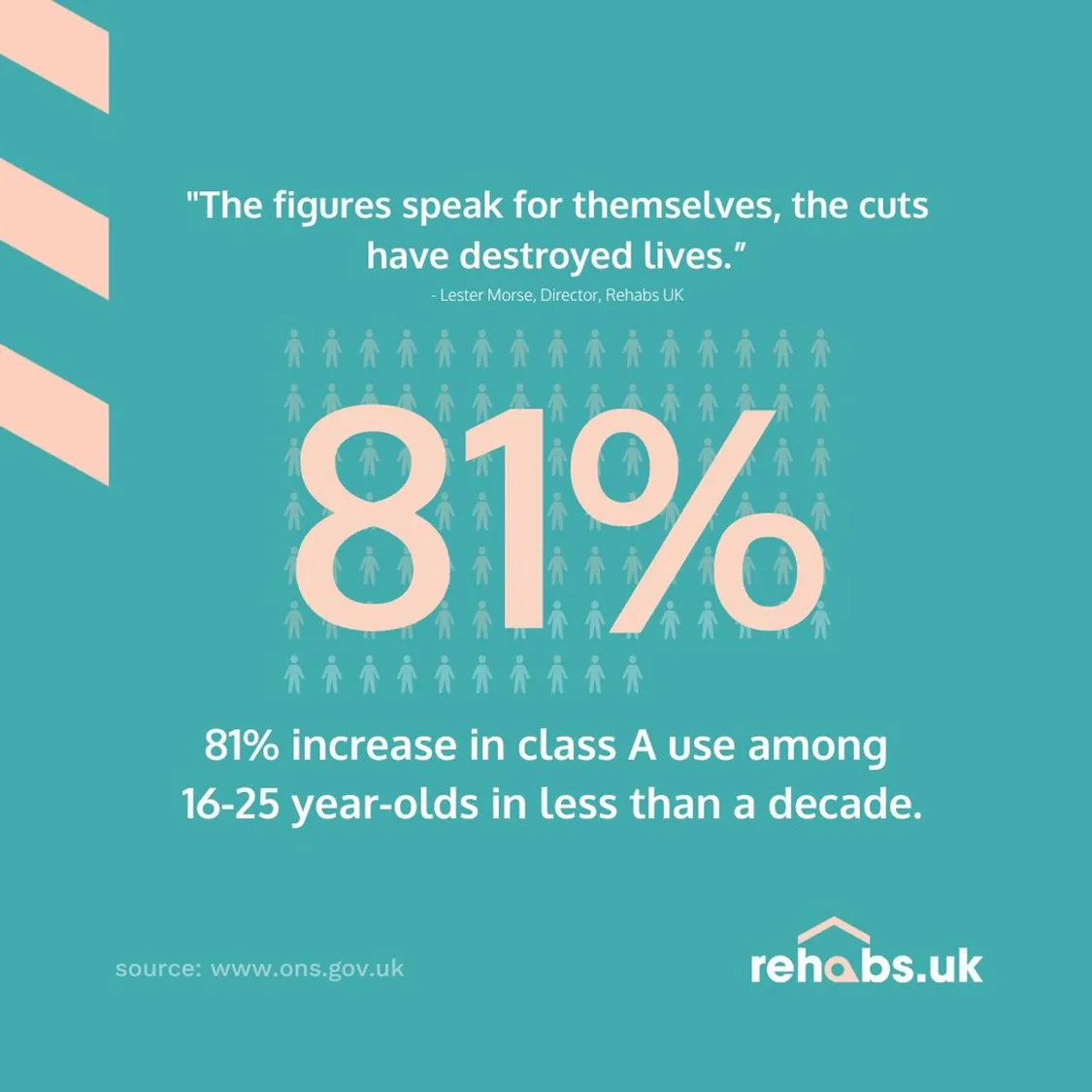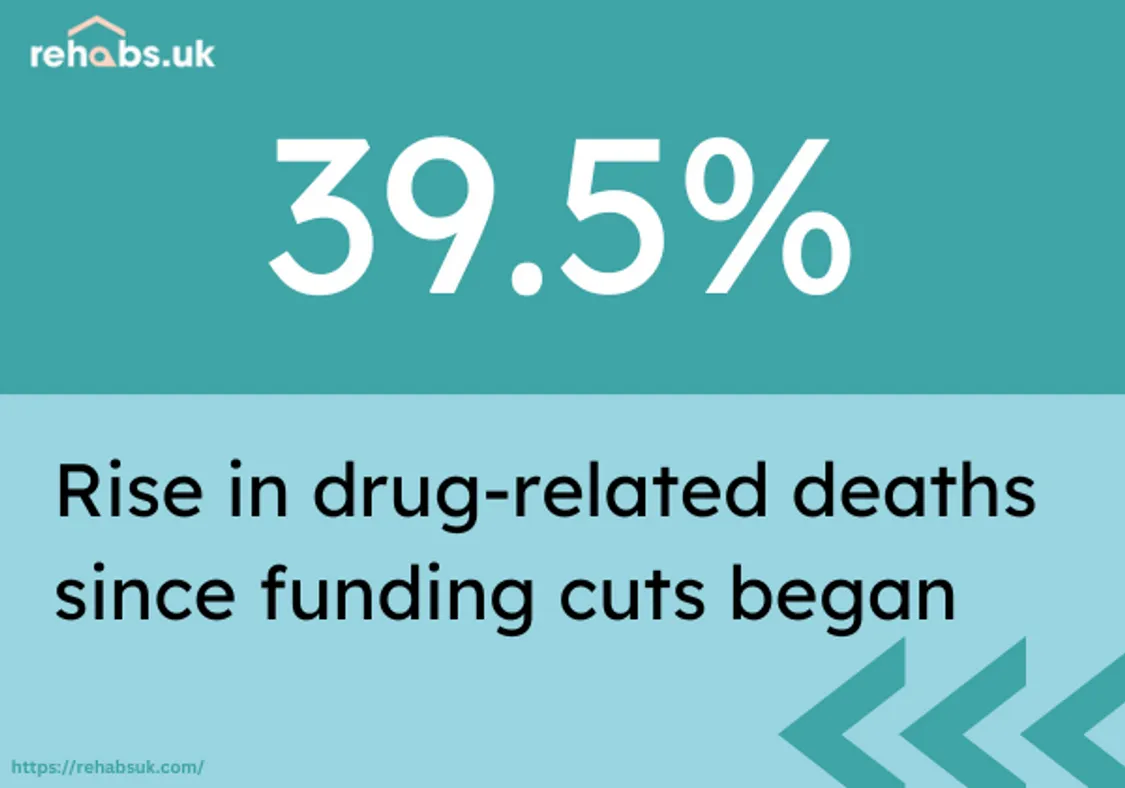31 Aug 2025
In the decade since the introduction of the Health and Social Care Act 2012 there have been drastic cuts to addiction services, as funding for drug and alcohol treatment across England and Wales has steadily declined.
First published on 27th March 2012, the Health and Social Care Act 2012 was described as “the most extensive reorganisation of the structure of the National Health Service in England to date”. When changes outlined in the Act came into force in April 2013, they moved addiction services in England and Wales from being directly funded by the central government, to being commissioned at the discretion of local authorities.
Each Conservative government since 2010 has slashed local authority funding, with councils across the country seeing an average funding drop of 29% by 2020. With no set limit on how much cash should be ring-fenced for addiction treatment, these vital services have been cut down and wiped out by local authorities desperately trying to make savings.
“People with drug or alcohol dependence are stigmatised and so their services are often the first to be axed.” - Professor Colin Drummond, Head of the Alcohol Research Group and Consultant Psychiatrist at the National Addiction Centre.
It’s no surprise that as spending on drug and alcohol services has declined, the number of hospitalisations and deaths related to drug use has shot up.
“This government, and those before it, fail to see the damage they cause. Not to mention the strain these cuts place on those of us who are left to pick up the pieces. We and other rehab services do what we can, but the government must do more. The figures speak for themselves, the cuts have destroyed lives.” - Lester Morse, Director, Rehabs UK
Health and Social Care Act 2012: 10 years on…

The figures speak for themselves.
Given the government’s “commitment” ten years ago, the sheer scale of funding cuts to addiction services and school substance misuse support is staggering.
Before the Health and Social Care Act 2012, Government investment in addiction services was a long term commitment. In fact, up until 2012 we saw consistent decreases in drug-related deaths annually. But the Act, and more than a decade of Conservative austerity, has changed that.
- The number of drug-related deaths in England and Wales rose 87.1% between 2012 and 2021 (ONS)
- Hospital admissions in England and Wales for narcotics poisonings rose 13.2% between 2012 and 2021 (NHS)
In March 2013, just before funding changes came into force, the percentage of adults aged 16-24 taking class A drugs in the UK was 4.8% and the total taking any drug was 16.5% Drug misuse figures updated in March 2020 show that this has risen to 8.7% for class As and 20.3% for all drugs.
That’s an 81% increase in class A use among 16-25 year-olds, and a 23% increase in overall drug use in that age group, in less than a decade. Even with the recent promise of better funding and intervention to come, figures suggest that it will be a long time yet before drug use and drug-related harms return to their previous, smaller scale.
Cuts to crucial drug and alcohol support
Ten years on from the Health and Social Care Act 2012, it’s clear that the needs of seriously vulnerable addicts are still not being met. Austerity has shifted pressure onto overstretched local authorities, ultimately leading to understaffing in addiction services, training cuts and an inability to help some of the most vulnerable.
During the first four years after changes kicked in (2013-2017), funding for drug and alcohol treatment across England was cut by 16% - equating to tens of millions of pounds worth of cuts.
As just one example of the scale of the issue, Birmingham city council cut their addiction treatment budget from £26 million to £19 million in the 2015-16 period in order to cut costs. That’s a reduction of almost 27%.
“There’s a feeling of hopelessness, as addiction services like ours do everything they can to help those suffering with alcohol and drug addiction, knowing full well that alone, we won’t be able to provide essential and potentially life-saving care to everyone that needs it.” - Lester Morse, Director, Rehabs UK
Between 2015 and 2020, £7.7million of funding was also cut from school alcohol and drug support services. Funding dropped -47%, from £16.43million in 2015 to £8.72million in 2020. The biggest cuts were in Yorkshire, the South East and Outer London, in deprived areas where many are vulnerable and at a high risk of falling into addiction.
And while new funding announced in 2021 is a step in the right direction, the reality is that new measures don’t go far enough.
Drug use, hospitalisations and excess deaths: the figures

Below are some facts around the dramatic increase in drug usage, hospitalisations and deaths in England and Wales in the last decade:
In a recent study, Alcohol-specific deaths were the largest contributor of DoD, accounting for 44.1% (95%CI 43.5–44.8%) of all such deaths. Living in the North, unemployment, White British ethnicity, living alone, economic inactivity, employment in elementary occupations, and living in urban areas were significantly associated with elevated DoD risk.
- The number of drug-related deaths in England and Wales rose87.1% between 2012 and 2021 (from 2,597 deaths in 2012 to 4,859 in 2021) (ONS)
- The decade spanning 2012-2021 saw 39.5% more drug-related deaths overall than the previous ten years (ONS)
- In 2012 there were 14,893 hospital admissions in England and Wales for narcotics poisonings. In 2021 there were 16,859 - an increase of 13.2% (NHS)
- 7.1% of hospital admissions for narcotics poisonings in 2021 (1,197) were young people aged 15-19, while 2.2% (377) were children aged 10-14
- A 2021 government report on drug use in young people notes that 76% of young people starting treatment for addiction between April 2019 and March 2020 began using substances before the age of 15.
Cocaine use in particular is rising rapidly – find out more about that here.
Tens of thousands of deaths were avoidable
The statistics around deaths and hospitalisations caused by drugs are startling. Because we work closely with people with addiction, we know that deaths by addiction are avoidable – and the data supports this too.
In the 10 years from 2012-2021, the number of drug deaths in England and Wales averaged 3,824 deaths per year. In the previous 10 years, the average was 2,741 per year (27,417 total).
The original figure was already high, but those numbers suggest that as many as 10,827 deaths in the last decade could potentially have been avoided if funding and support had not been cut.
The North East, Yorkshire and the East Midlands have seen some of the highest increases since the Conservatives came into power, with each region having had over 130% more deaths related to drug poisoning in 2021 than in 2010, according to data from the Office of National Statistics (ONS):
- North East +135%
- Yorkshire and the Humber +139.8%
- East Midlands +132.6%
One thing we aren’t able to see clearly in the above data is the broader range of devastating effects that drug and substance abuse can have on loved ones and families.
How many more deaths, assaults and mental health issues are related to the increase in drug use? How much trauma, and how many broken homes? Government and NHS statistics only give us part of the picture.
Impact on healthcare staffing and training
Of course, one impact of the cuts has been a reduction in staffing levels for addiction treatment and support services. Worse still, there is a distinct lack of trained professionals able to properly support those in need.
In 2017, Professor Colin Drummond stated:
“The main opportunity to make cuts is in the workforce, meaning fewer specialist addictions psychiatrists, clinical psychologists, and nurses, and a greater reliance on doctors without specialist training and volunteers with limited training. The number of training posts in addictions psychiatry has decreased by 60% since 2006”.
At Rehabs UK, we’ve seen the impact of this first-hand, especially when it comes to dual diagnosis and co-occurring disorders which are so common with addiction.
Professor Drummond went on to say that:
“While 10 years ago there were 52 trainees, a Royal College of Psychiatrists survey found that in 2016 just 21 senior trainee posts were filled…Addictions services increasingly struggle to find qualified specialists, leading to lower standards which impact on the effectiveness and safety of patient care. To meet the needs of people with drug and alcohol problems, we must return the number of addictions psychiatry training posts in England to 60”.
A 2020 report from the Royal College of Psychiatrists states that by 2019 there were only 16 people in higher training posts that would give them a qualification in Addiction Psychiatry in England. And five out of 12 English regions now have no trainees at all. There is a distinct lack of professionals who are adequately trained to deal with addiction psychiatry, and growing volumes of people in need of that professional help.
“Without urgent investment from government, training in the specialist skills that are an essential part of the treatment system could be wiped out in a decade, depriving thousands of people with this life-threatening condition access to the specialist help they need to recover and rebuild their lives” - Professor Julia Sinclair, Chair of the Addictions Faculty at the Royal College of Psychiatrists
Government cuts to policing and other much needed essential services mean that the wider societal harms of both drug and alcohol use are also not being dealt with. According to research conducted by the Institute of Alcohol Studies in 2015, on average 53% of a police officer's workload is alcohol-related, while around 20% of a fire and rescue team’s working hours are spent dealing with the consequences of drinking. And this is without the inclusion of drug use.

The government’s ‘drug strategy’ announcement
In December 2021, the government introduced its new 10-year drug strategy, pledging £780 million to “rebuild the drug treatment system”.
“Every local authority in England to receive extra funding to combat drug and alcohol misuse over next three years, with areas in greatest need receiving extra funding first”
Despite this, for 2022 to 2023, only £101.2million has actually been allocated in additional grants for treatment and recovery services, beyond what was already in place.
This is not enough to repair the damage caused over the previous decade, nor will it bring back the lives lost as a direct result of dire underfunding.
Funding for drug treatment services had grown consistently year-on-year prior to the Health and Social Care Act being brought in. It was protected by the National Treatment Agency for Substance Misuse (NTA), who had an annual budget of £467 million by the point at which funding was shifted elsewhere and ceased to be ring-fenced for opioid treatment services.
When adjusted for inflation, £467 million in 2012 is the equivalent of £598,708,744 today.
The 2021 Drug Strategy claims to be setting aside record sums to tackle drug use. Yet the government’s plan to spend £780,000,000, if condensed over the first three years rather than the full ten, works out at just £260 million per year. Comparing that against 2012’s figures, adjusted to account for inflation, that’s a-56.6% reduction on pre-cuts spending. Even without adjustment, it’s a -44.3% drop.
And that’s working on assumptions that spending targets are actually met by the end of the third year. Which could be unlikely, since 2022-23 only has £101.2 million allocated.
“The government’s Drug Strategy is a farce. For all their talk about how this is a record amount of spending on the drug treatment services, it is insufficient and barely gets us back to where services were before 2012” - Lester Morse, Director, Rehabs UK
It doesn’t have to be this way…
We’re sceptical of the government's December 2021 promise of improved funding for addiction services. The ’record increase’ falls short of previous spending in real terms.
As such, Rehabs UK calls upon the UK government to:
- Fund drug and alcohol prevention services adequately with realistic budgets
- Improving funding for other health and social care provisions that prevent and tackle harm
- Take the pressure off of local authorities and be accountable
- Treat the causes of addiction, not just the effects
“Even though the Dame Carol Black report says that for every £1 spent on addiction treatment, the treatment services give back a £4 return to society, money alone is not going to fix this. In my opinion, society needs to change its mind on how it treats addiction or we will forever be pouring money into a bottomless pit. The majority of funding is used to reduce the harmful effects of addiction, which creates a revolving door, parking people in treatment services until they die. We need to understand and treat the cause of addiction before real change can happen - as we know recovery is possible!” - Lester Morse, Director, Rehabs UK
Here to help
If you or someone you know is struggling with addiction, Rehabs UK is here to help. We offer free assessments with our trained treatment advisors, and can support you in finding the best rehab or treatment plan to start a recovery journey.
You can find all of our contact information here or find out more about Rehabs UK here.
